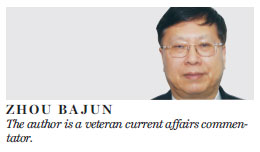Universal suffrage can be realized
Updated: 2015-04-22 08:25
By Zhou Bajun(HK Edition)
|
|||||||||
Zhou Bajun says the SAR government has to garner sufficient public support to press some opposition lawmakers to vote for the reform package
Today, the SAR government unveils its proposals for the election of the Chief Executive (CE) by "one person, one vote" in 2017.
All 27 opposition lawmakers have repeatedly said they would veto reform proposals in the Legislative Council (LegCo). They argue that these fail to meet the "international standards" required for a truly democratic and open election.
Prior to the announcement of the reform proposal, Chief Secretary Carrie Lam met lawmakers from all political parties and some independent lawmakers. She communicated the message from Beijing to the opposition camp that there could be no retracting, revising or reversing of the National People's Congress Standing Committee's (NPCSC) August 31, 2014 decision. Lam said that in June 2010, Beijing approved the Democratic Party's "one man, two votes" proposal for the 2012 LegCo election. But there would be no last minute changes for the electoral reform package this time.
After the reform proposal was released, the government and the "Love the Nation and Love Hong Kong" camp launched major campaigns to mobilize public support. They are still trying to encourage some opposition lawmakers to change their position and vote for the reform proposals.
The method proposed by the government for electing the CE in 2017 is genuine universal suffrage. In granting the right of "one person, one vote" to more than 5 million qualified Hong Kong permanent residents for the CE election, the reform proposal allows for genuine competition during the process of nominating candidates. Anyone who conforms to the requirements of Article 44 of the Basic Law, and who hopes to run for election as CE in 2017, will require only 120 nominations from members of the 1,200-strong Nominating Committee (NC) to qualify as a candidate. But a cap of 240 recommendations, which a hopeful can secure from the NC, will prevent a single aspirant from getting the support of an absolute majority of the NC. This would allow five to 10 aspirants to become potential candidates. Of these, the NC will select two or three as formal candidates.
Based on the current political situation in Hong Kong, one or two representatives from the opposition camp could pass the "threshold" needed to become potential candidates. Whether or not any of them would be able to garner over 600 votes from the NC members to become a formal candidate depends on the preferences of NC members.
Some argue that the formation of the NC for selecting the CE by universal suffrage in 2017 is the same as for the 2012 CE Election Committee (EC). Therefore, potential candidates from the opposition camp would be excluded from the list of formal CE candidates.
But this is not a valid argument. First, the members of 1,200-strong NC won't be the same as those of the EC. Second, the function of the NC is different from that of the EC. Third, the NC will vote for CE candidates by secret ballot. This is different from the EC voting for the CE. The opposition camp will have the chance to lobby some NC members. The city's political landscape is changing dramatically. While competition for the 2012 CE election was fierce, the forthcoming 2017 CE election is expected to be even more fierce. But it is wrong to believe that the 2017 CE election will be controlled by anyone.
Nevertheless, the reform proposal is unlikely to please even the so-called moderate "pan-democrats". They still oppose the requirement that potential candidates, who have already secured 120 recommendations from the NC, must also gain the support of more than half of the NC members to qualify as formal candidates for the CE election. The government, therefore, has to garner sufficient public support to make it work.
Hong Kong people must understand that the election of the CE by universal suffrage in 2017 has to be conducted in strict accordance with the "One Country, Two Systems" principle. The requirement that CE candidates secure the votes of over half of NC members is to ensure the election of a CE acceptable to the central government. This is crucial for the continued implementation of the "One Country, Two Systems" policy. The assumption is that, according to the current political situation in Hong Kong, more than half of NC members would back the principle of "One Country, Two Systems".
A taskforce including representatives of five opposition parties, the Hong Kong Federation of Students and Scholarism, is finalizing details of a so-called referendum. This would be triggered by Democratic Party lawmaker Albert Ho's resignation from LegCo.
The "referendum" will ask people to vote on whether the Basic Law's articles on the reform of the LegCo and CE elections should be amended. This again shows that achieving universal suffrage in Hong Kong is an extremely difficult task for the government, the patriotic camp and ordinary citizens.

(HK Edition 04/22/2015 page10)